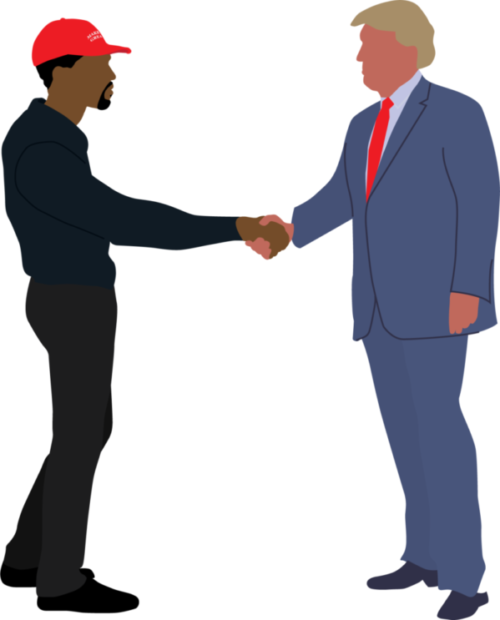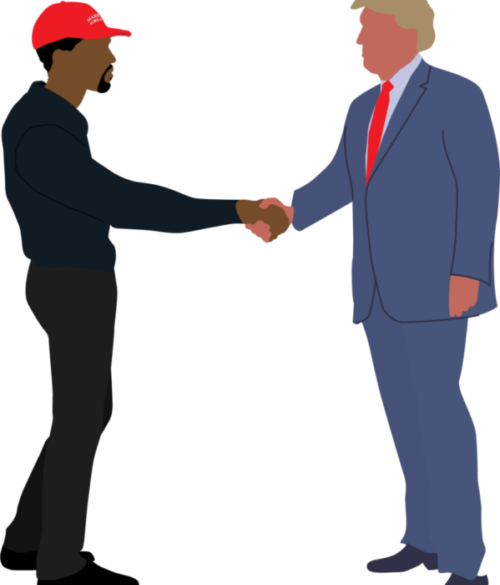Kanye West’s support of President Trump is just one example of how celebrities use their powers to influence politics.
I just wanted to know that Kanye West, the musical inspiration of my adolescence, was okay.
He was hospitalized for a “psychiatric emergency” just a few months after I saw him live for the first time on the Saint Pablo Tour. The tour, mixed with being thousands of miles away from his wife when she was robbed at gunpoint, seemed to be the catalyst that put him in the hospital.
His hospitalization was followed by silence. He obviously needed some time off with his family to collect himself. Still, as a fan, I wanted to know he was okay.
In the midst of his silence, I accepted that even if he never came back to the spotlight, if he never made another song or shoe, I would be happy as long as he was happy and was able to be at peace with himself and his family.
So it was to my surprise when the first time I saw him back on the news, about a month after his hospitalization, his hair was dyed blonde, and he was posing next to then-president-elect Donald Trump at Trump Tower.
There was a time when I naively thought Kanye’s support for Trump would go away. Obviously it didn’t, and the image of him hugging our president in the Oval Office will be bleached into my mind forever. But there was one thing that stood out to me during his blissfully chaotic visit to the White House: He said when he puts on the “Make America Great Again” hat, it makes him feel like a superhero.
For years, I’ve watched Kanye battle depression and mental illness, hoping that he would one day find peace with himself and the world around him. He seems to have finally found that peace in Trump’s America. Now I just have to find peace with his decision to support Trump.
Hollywood, since its star-studded beginning, has always been political. Politicians would often seek out the endorsements of celebrities to try to get the extra advantage in an election. From Frank Sinatra coining a jingle endorsing John F. Kennedy to Willie Nelson recently playing a song called “Vote ‘Em Out” at a rally for Senate nominee Beto O’Rourke in September, musicians especially have often found themselves involved with politics.
Social media, though, has changed the medium in which endorsements take place. Celebrities no longer need to take time to even go to a rally for a candidate. Taylor Swift, who has historically been apolitical in the public eye, can effectively endorse a candidate all from her phone, like she did when she got on Instagram to endorse two Tennessee Democrats and outline her political views.
Kanye and Swift could very well be setting the precedent for what a celebrity endorsement looks like in the modern political theatre. Kanye recently outlined all of his political beliefs on Twitter, such as supporting asylum for those seeking to escape war in their home countries by coming to America. He also mentioned prison reform and “common-sense”gun laws before proclaiming that he will be distancing himself from politics.
It’s unclear whether this hiatus will be permanent or not. However, Kanye can’t delete the impact he’s had on the political world, the Trump administration, and his fans.
Barring any actual crime or other similar scandal, I will always stand by Kanye. As a fan, though, am I responsible for what this man does or feels? If he decides to once again get on Twitter and support Trump, does that mean I’m a Trump supporter?
In order to get a better grasp on what the West-Trump relationship could mean, I talked to David Jackson, a political science professor at Bowling Green University, about the effect of celebrity endorsements and activism.
“When a celebrity has their name with it, there will be more attention toward an issue,” says Jackson, though his studies have found that notoriety does not always equate to credibility when it comes to the public eye.
Notoriety and fame can be gauged by numbers (amount of followers on social media, album/movie sales, etc.), but credibility can’t always be defined by a tangible figure. Most of the time, credibility is measured by someone’s job or experience, which works against celebrities because their jobs can often be seen as superfluous.
Jackson says notoriety, credibility, and likeability are the most important concepts in celebrity endorsements. A celebrity’s credibility is often determined by what they do outside their job, such as working toward charitable causes. Notoriety and likeability are related but aren’t always correlated.
Amy Schumer, for example, may not be the most credible opinion when it comes to politics based solely on her acting career, but the fact that she has been outspoken on issues ranging from gun violence, to female rights, to sexual assault, has legitimized her beliefs among her base. Mix all that with the fact she got arrested alongside 300 others while protesting the nomination of Brett Kavanaugh for a Supreme Court Justice seat at the U.S. Senate building, and she’s basically a modern-day political martyr. Her Kavanaugh protest might have had a bigger impact than her cousin, Senate Minority Leader Chuck Schumer, had with his dissenting opinion in the eventual confirmation of Kavanaugh, even though Chuck Schumer has been a senator for 20 years and represents the opinions of 46 other Democrats in the U.S. Senate.
This also reflects a point Jackson brought up about how some celebrities are only famous in their subgroups and, in some cases, have little to no impact on the general population. A famous Twitch streamer might be unrecognizable to the general public, but could be very influential to their base, for example.
With so many different types of media to follow and become famous through, fame is a hard thing to define today. But certain celebrities, such as Kanye or Taylor Swift, transcend all walks of life and are recognized by almost everyone.
Jackson’s research has also found that celebrity endorsements have the potential to harm candidates more than they actually help. People are less likely to vote for a candidate if the person is endorsed by a celebrity they don’t like. Celebrity endorsements are tricky and can sometimes backfire on a candidate.
So, did Kanye’s endorsement actually help Trump? Trump did boast that his support among African-Americans doubled after Kanye’s endorsement, though the poll he cited was proven by Politifact to be unreliable at best. Whether or not Kanye will sway people to become Republicans or vote for Trump in 2020 remains to be seen.
I highly doubt Kanye will have that large of a political impact, though ultra-conservative pundits Candace Owens and Charlie Kirk, among others, have begun championing Kanye on social media. So, it wouldn’t be too outrageous to predict that Kanye might one day become a conservative icon of sorts. However, they seem to ignore Kanye’s claim that his “principles” are more aligned with Democratic socialist Bernie Sanders.
For example, Kanye donated more than $70,000 to a Democratic candidate for a Chicago
mayor in October. This is similar to a young Donald Trump, who often supported issues and parties on both sides of the political spectrum prior to re-registering as a Republican in 2012.
Just because Kanye says he’s distancing himself from politics does not mean he’s staying away forever. Trump took similar actions over the years to focus on his business and other matters.
If Kanye truly wants to run for president one day, his fanning of the political fire is similar to that of Trump, who constantly alluded to a possible presidential run before actually doing it. Trump’s mull over the presidency dates back as far as 1988 and is sandwiched between his oft forgotten presidential campaign in 2000, when he said his first choice for vice president would be Oprah Winfrey.
Jackson says it’s just as possible the public will get fed up with political outsiders by the next election, choosing to elect a “boring candidate” with an extensive political background in 2020.
Jackson says he gets asked by his Canadian friends if Trump’s presidency is setting a “political
outsider” precedent, where elected positions are filled by people who have little to no prior political
experience. He’s not sure whether Trump is setting a trend, pointing out the fact that Trump had a very unique platform prior to running for president that cannot easily be replicated by other candidates. Few celebrities have the experience of running a billion-dollar company while also possessing the polarizing level of celebrity that Trump had prior to his successful presidential campaign.
However, if Kanye’s fashion brand Yeezy really is worth $1.5 billion, Kanye’s platform and qualifications for the presidency would be roughly the same as Trump’s prior to taking the highest office in the country.
Jackson has come to the conclusion from his research that, among those who are influenced politically by celebrities, fans typically seek to adopt the opinions and endorsements of the celebrities they follow. But with a polarized figure like Kanye, it’s tough to adopt all his beliefs. From claiming AIDs was administered by the government to reducing more than 400 years of slavery in the U.S. to a personal mindset of the victim and saying it’s a choice, Kanye has been dead wrong on plenty of ideas that I’ll never support.
But how much does what Kanye supports actually affect me? Slug, co-founder of the rap duo Atmosphere, put it best when he said, “The stars in the sky don’t sponsor my house, so I pay no mind to what comes out of their mouths.” As a consumer of Kanye’s music and artistry, I can absolutely love and support the man without caring about his political opinions.
And he has had some opinions I agreed with. Days after Trump said he wanted Chicago to use stop-and-frisk tactics to try to lower violence in the city, Kanye was there in Washington to tell the president that stop-and-frisk has proven to be ineffective and racist. Kanye also brought up important points about what Chicago is doing to provide mental health resources to its citizens.
So, there are some good things coming out of this West-Trump relationship, even if it has caused some serious pain for longtime Kanye supporters. Throughout my life, Kanye’s music has uplifted my spirit and given me the confidence I needed to take on the world. In a way, his music made me feel like a superhero. And if Trump gives him that same feeling, who am I to tell Kanye to stop supporting him?
This essay was originally published in the fall 2018 print edition.




